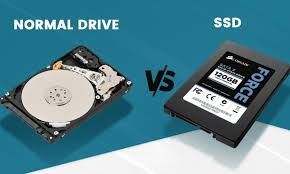HDD Vs SSD
Difference
5/27/20252 min read


SSD vs HDD:
Which One Should You Choose for Your Laptop?
A Beginner-Friendly Guide for Performance-Focused Users
When buying or upgrading a laptop, one of the most important decisions you'll face is choosing between an SSD (Solid State Drive) and an HDD (Hard Disk Drive). If you're focused on performance—faster boot times, quicker app launches, and smoother multitasking—this choice matters more than you might think.
Let’s break it down in simple terms to help you decide which one is right for your needs.
🔍 What’s the Difference Between SSD and HDD?
HDD (Hard Disk Drive)
Think of an HDD like a record player. It uses spinning disks (called platters) and a moving read/write head to access your data. It’s an older and more traditional form of storage.
Speed: Slower (especially for booting up and loading apps)
Capacity: Typically offers more storage for less money
Durability: More fragile (moving parts = more risk of failure)
Noise: Can be noisy due to spinning disks
Price: More affordable per GB
SSD (Solid State Drive)
An SSD is more like a giant USB stick—no moving parts, just fast, silent, and efficient flash memory.
Speed: Significantly faster (boots in seconds, apps launch instantly)
Capacity: Generally lower capacities for the same price
Durability: More resistant to shocks and drops
Noise: Completely silent
Price: More expensive per GB, but prices are dropping
⚡ Performance Comparison
Feature HDD SSD Boot Time 30-60 seconds 10-15 seconds File Transfer Speed 80-160 MB/s 200-5000+ MB/s (varies by type) Game/App Load Time Slower Much faster Power Consumption Higher Lower Noise Level Audible Silent
💻 Which Should You Choose?
Here’s a quick guide based on your priorities:
✅ Choose an SSD if:
You want your laptop to boot quickly and feel responsive.
You frequently open large apps or multitask.
You prioritize speed and performance.
You travel a lot and want something more shock-resistant.
✅ Choose an HDD if:
You need lots of storage on a tight budget (e.g., for videos, photos).
You don’t mind slower performance.
You mostly use your laptop for basic tasks like browsing or writing.
💡 Best of Both Worlds?
Some laptops come with hybrid storage—an SSD for the operating system (speed) and an HDD for bulk storage (capacity). If your budget allows, this combo offers a nice balance of speed and space.
🏁 Final Thoughts
If you're a performance-focused user—someone who values speed, responsiveness, and efficiency—an SSD is the clear winner. While it may cost a bit more, the performance boost is well worth it. Think of it as an investment in your productivity and overall laptop experience.
Still unsure? Here’s a quick rule of thumb:
For speed → SSD. For storage → HDD. For both → consider a dual-drive setup.
Need help choosing the right SSD size or type (like SATA vs NVMe)? Just ask—we're here to help you make the smartest tech choice for your needs.
